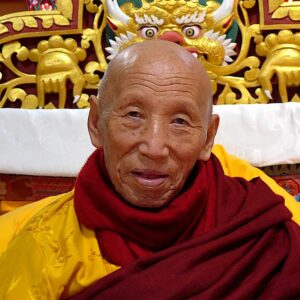Practicing Dharma Authentically Means Commitment
When we really want to practice Dharma we wish to carry on until we die. We don’t want to stop! Dharma practice is a continuous journey. Of course, we want to continue until enlightenment but as we begin, we can think, “I want to practice at least until death”.
Practicing Dharma: Sincerity and Reflection
 But these days we notice so many people not progressing continuously, steadily, slowly, gradually moving upwards. Instead, we may see them going downwards, sometimes stopping and starting, sometimes completely stopping. They have lost all inspiration to practice. They have knowledge of dharma, they have understood some teachings, but they lack inspiration. Do we want to be like that? What is missing? What is lacking in this type of person? It is sincerity, it is the reflection portion that is missing.
But these days we notice so many people not progressing continuously, steadily, slowly, gradually moving upwards. Instead, we may see them going downwards, sometimes stopping and starting, sometimes completely stopping. They have lost all inspiration to practice. They have knowledge of dharma, they have understood some teachings, but they lack inspiration. Do we want to be like that? What is missing? What is lacking in this type of person? It is sincerity, it is the reflection portion that is missing.
He or she is viewing the dharma as being “out there” –not right here! As soon as we can begin to view the dharma as internal, as being with us always then it becomes simple. The traditional view of dharma practice is very simple. We do the practice that we have been taught, we recognize the benefits but we also let go of attachment to the result. We let go of our obsessiveness and allow the practice to become natural, a part of us.
Practicing Dharma: Allow the Benefits to Manifest
We need to learn how to make our practice dynamic, make it alive and JUST DO IT! No one other than ourselves can convince us of the benefits. Science may explain the benefits, but we need to see this for ourselves. Reflect and allow the dharma to become dynamic, real, authentic. The teacher may explain the benefits and we will think inwardly, ” yeah, I know”, but without reflection no matter how many times we hear that, it will not help.
For example, if we watch a romantic film after having had a personal experience of romance we will cry, we will be moved, it will be so touching. If we have had no romantic experience or perhaps a bad romantic experience then the story will not touch us in the same way. If we haven’t experienced a taste of meditation from regular practice, then our teacher’s words don’t bring many benefits.
The First Base or Ground of Dharma is Mind
How can we explain to others about our dharma practice? We can speak simply as Rinpoche has done here in the video. It is not necessary to explain lots of fancy practices; we can just talk about the mind. To explain something to a friend, we need to find some common ground. The person listening has a mind and the person talking also has a mind. If you talk about something formal you do..meditation, chanting or whatever you may lose them because they do not do what you do…you have lost the common ground.
 But they do have a mind, you also have a mind so there is common ground. We begin here. The mind has no nationality, no passport. Our names are given to us, and our face is not who we are. Our body also does not define us.
But they do have a mind, you also have a mind so there is common ground. We begin here. The mind has no nationality, no passport. Our names are given to us, and our face is not who we are. Our body also does not define us.
What about our minds? Can we really have such a thing as a British mind? So we have neutral ground, whether we are British, American, Nepali. We all have an ego, we all have anger, we all experience disappointment, so we have this same neutral ground. So the first thing in our practice of dharma is to understand the mind. Recognizing the power of the mind and yet also the fragility of the mind. This mind which one moment feels strong can change and develop a victim mentality. And our mind changes so rapidly, we have no stability.
Practicing Dharma: Habit
Why is this mind so changeable, so fragile? It is because of habit? We have this habit of thinking. We have no habit of staying in one place. Instead, our minds always move like on a wild horse, galloping away. These habits soon become part of our nature, our character. So after meditation, we may miss our anger, our jealousy, our habits so we search for them. We think that they are the real “ me” the real “ I” our real character, but no they are not, this is our mistake. Our true nature is not these changeable emotions and thoughts that are constantly moving through our minds.
So to recap we begin by examining our mind, looking at our mind, reflecting upon the strengths and weaknesses of our mind. And we acknowledge how very easily habits are formed–good habits and negative habits. These habits soon become thought of as us..who we are. We identify with them. But that is our first mistake; habits are not us.
So, begin with this investigation!
Reflection Exercise
Begin our day with an investigation into our mind, what qualities do we have? What strengths do we have? What weaknesses do we have? What are our strongest habits? Are these habits helpful to ourselves and others or are they harmful?
At the end of the day, look back and again examine, “ Did I get totally lost in my thoughts and emotions today? Was I able to retain some mindfulness, some quality of remembering to check and examine this mind?”
Make this a new habit! Resolve to start a habit of self-reflection, a positive habit of mindful inquiry.










Responses